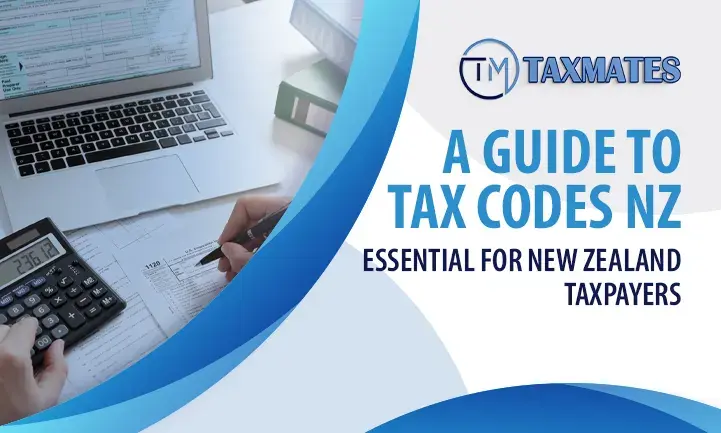Tax codes are alphanumeric sequences used by the Inland Revenue Department (IRD) to calculate the amount of tax to deduct from your income. Each tax code represents a specific tax rate based on your circumstances, ensuring fair taxation across different income levels and employment situations.
Understanding tax codes is essential for every taxpayer in New Zealand. Tax codes determine how much tax you pay on your income, ensuring accuracy is crucial to avoid penalties and unnecessary payments. This guide from Taxmates will delve into the details of tax codes in New Zealand, helping you navigate through the complexities by providing Financial Advice.
Understand Your Tax Code
Before diving into the details of tax codes nz, it’s essential to understand your tax code. Your tax code is determined based on various factors, including your employment status, income sources, and any applicable deductions or allowances. If you’re going to file your taxes then the knowledge of tax codes can save you from several financial damages or disadvantages.
Types of Tax Codes
There are several types of tax codes in New Zealand, each serving a distinct purpose:
- Standard Tax Codes: These are the most common tax codes assigned to individuals with regular employment income.
- Secondary Tax Codes: Used when you have multiple sources of income or are working multiple jobs simultaneously.
- Special Tax Codes: Applied in specific situations, such as non-resident taxpayers or individuals with unique tax obligations.
Determining Your Tax Code
Your tax code is determined based on your circumstances. Factors such as your employment status, income level, and any deductions or allowances you’re eligible for play a crucial role in determining the appropriate tax code for you.
Here’s a table representing the tax rates for different income brackets in New Zealand:
| Income Range (NZD) | Tax Rate (%) |
| Up to $14,000 | 10.5 |
| $14,001 – $48,000 | 17.5 |
| $48,001 – $70,000 | 30 |
| Over $70,000 | 33 |
Please note that these tax rates apply to the taxable income within each bracket. Additionally, individuals may have different tax obligations based on factors such as
List of Tax Codes NZ
In New Zealand, there are several tax codes used by the Inland Revenue Department (IRD) to calculate the amount of tax individuals need to pay on their income. Here is a list of some common tax codes:
- M – This tax code is for individuals who are eligible for the Independent Earner Tax Credit (IETC).
- ME – The ME tax code is for individuals aged 65 and over who qualify for New Zealand Superannuation or Veteran’s Pension.
- M SL Tax code – Used for individuals who have a student loan repayment obligation.
- M SL M – Similar to M SL but also eligible for the Independent Earner Tax Credit.
- M SL MB – Used for individuals with a student loan repayment obligation who are also eligible for the Independent Earner Tax Credit.
- M SL ME – For individuals with a student loan repayment obligation who are also eligible for New Zealand Superannuation or Veteran’s Pension.
- M SL ME SL – Similar to M SL ME but also have a student loan repayment obligation.
- SB tax code nz – This tax code is for individuals who are eligible for the superannuation prepayment scheme.
- S – Used for individuals who are eligible for the superannuation prepayment scheme and also have a student loan repayment obligation.
- S SL tax code nz – Similar to S but also have a student loan repayment obligation.
- SHC – This tax code is for individuals who are eligible for the overseas health and disability tax credit.
- ST – Used for individuals who are eligible for the overseas tax credit.
- ST SL – Similar to ST but also have a student loan repayment obligation.
- WT – This tax code is for individuals who are non-residents for tax purposes and don’t have a student loan repayment obligation.
- WK1 – Used for individuals who are taxed at the “no-notification rate.”
Common Tax Code Scenarios
Navigating through various life changes and employment situations can impact your tax code. Some common scenarios include:
- Changing Jobs: Your tax code may change when switching jobs, especially if there’s a difference in income or benefits.
- Receiving Benefits or Pensions: Income from benefits or pensions may require a different tax code to ensure accurate deductions.
- Working Multiple Jobs: If you’re working multiple jobs simultaneously, you may need a secondary tax code to account for the additional income.
Avoiding Tax Code Mistakes
To avoid tax code errors that could result in overpaying or underpaying taxes, it’s essential to:
- Regularly Review Your Tax Code: Ensure that your current tax code reflects your circumstances and income sources.
- Seek Professional Advice: If you’re unsure about your tax code or how changes may affect it, seek advice from tax professionals or the IRD.
Other New Zealand Tax Codes
In addition to standard tax codes, there are various other tax codes used in specific situations, such as:
- Special Situations: Tax codes may vary for individuals in special situations, such as non-residents or those receiving certain types of income.
- Tax Code Declarations: In some cases, you may need to declare specific tax codes based on your circumstances or deductions.
Ensure Accuracy of Your Tax Code
Maintaining accurate records and staying informed about changes in tax laws and regulations is crucial for ensuring the accuracy of your tax code. Taxation professionals keep detailed records of your income, expenses, and any changes in your circumstances to avoid discrepancies that you or your business can face.
Frequently Asked Questions
1. What is the difference between M and ME tax codes?
The M tax code is for individuals eligible for the Independent Earner Tax Credit, while the ME tax code is for individuals aged 65 and over who qualify for New Zealand Superannuation or Veteran’s Pension.
2. What is a tax code?
Tax code means an alphanumeric sequence used by the Inland Revenue Department to calculate the amount of tax to deduct from your income based on your circumstances.
3. How many tax codes are there?
There are several tax codes in New Zealand, including standard, secondary, and special tax codes, each serving different purposes.
4. How are tax codes worked out?
Tax codes are determined based on factors such as your employment status, income level, and any deductions or allowances you’re eligible for.
5. What do different tax codes mean?
Different tax codes represent different tax rates and deductions based on your circumstances and income sources.
Conclusion
Understanding tax codes is vital for every taxpayer in New Zealand. By familiarizing yourself with the different types of tax codes, common scenarios, and steps to avoid mistakes, you can ensure accurate tax deductions and compliance with tax laws.





